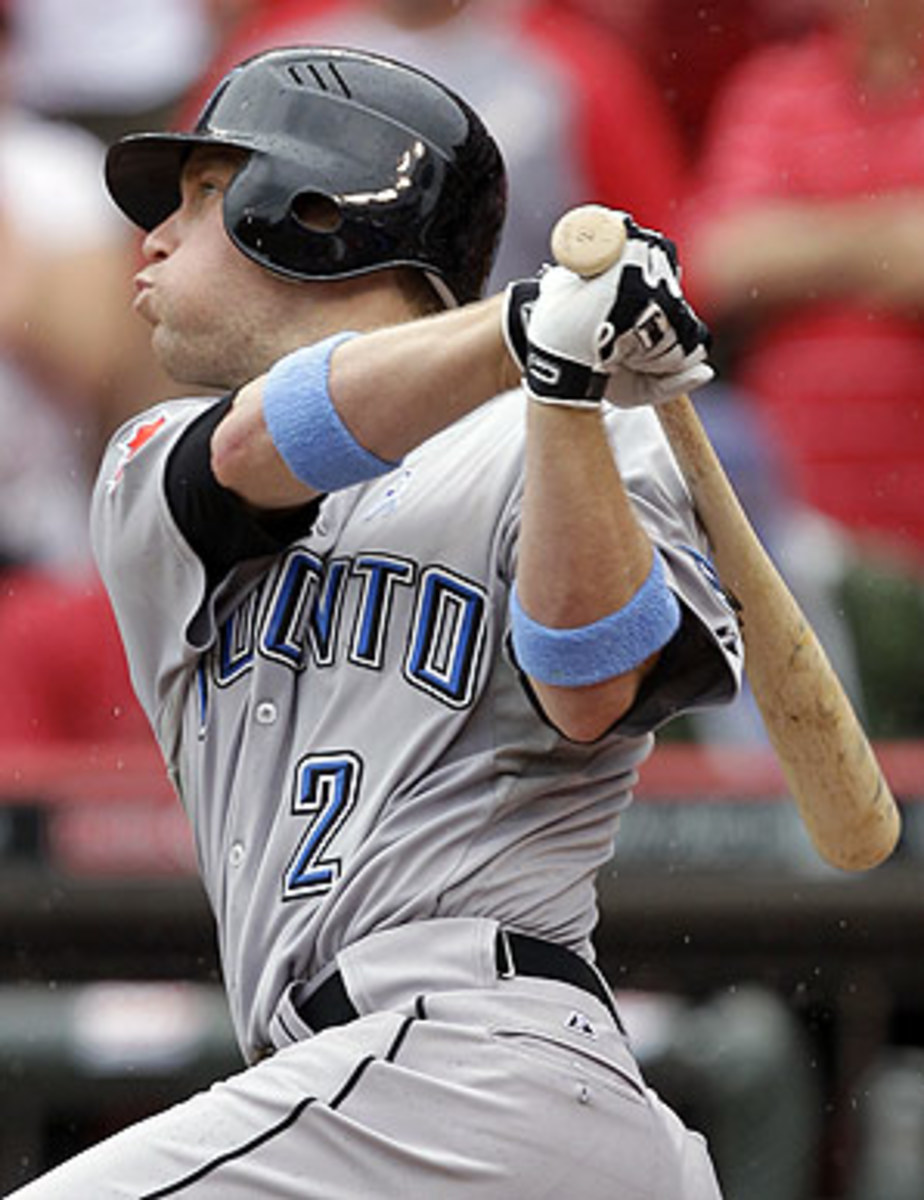Getting Hill won't be the answer Diamondbacks are looking for
Over the past two seasons, Aaron Hill has hit .213/.271/.359 despite playing his home games in a ballpark that's very friendly to right-handed hitters such as himself. Despite that performance, the Diamondbacks seem to have convinced themselves that he can help them create distance between themselves and the injury-riddled defending world champion Giants, who currently trail Arizona by one game in the NL West in what is by far the tightest playoff race in the major leagues entering Tuesday night's action.
In order to acquire Hill, who had been the Blue Jays' starting second baseman, Arizona sent their own starting second baseman, Kelly Johnson to Toronto. This despite the fact that Johnson has been the more valuable player this season, and that the two players are only a month apart in age (Hill is younger), are making nearly identical salaries ($5 million for Hill, $5.85 million for Johnson), and both are eligible for free agency after the current season (Hill has three years worth of club options left on his contract, the first of which is worth $8 million, but has done nothing in the last two seasons to suggest they should be picked up).
It doesn't take advanced mathematics to see Johnson's superiority. Both men play in hitter-friendly ballparks, and Johnson has hit .209/.287/.412 with 18 home runs this season to Hill's .225/.270/.313 with six homers. That's a slap-fight to be sure, but one Johnson clearly wins. Yes, Johnson has been ice cold in August, hitting a mere .140/.197/.263 with 18 strikeouts in 16 games, but Hill has hit just .170/.200/.250 on the month. In trading Johnson for the right-handed Hill, the Diamondbacks also lose one of the three lefty bats in their lineup, and have only one lefty on their bench in reclamation project Sean Burroughs.
The Diamondbacks also get veteran infielder John McDonald in the deal. That feels important given that Arizona seems to have just downgraded at second base and because its Opening Day shortstop, Stephen Drew, had his season ended by a fractured ankle in late July. That said, it's hard to see how McDonald offers an upgrade. Veteran utility man Willie Bloomquist has been Arizona's primary shortstop since Drew's injury, and while he's already set a single-season career high in starts at the position, and hardly resembles a championship-quality player in any respect, he's at worst McDonald's equal.
McDonald, who owes his major league career to defense, is a career .240/.276/.330 hitter and has been doing roughly that this season. Bloomquist, who owes his career to his defensive versatility, his speed, and his perceived grittiness, is a career .264/.316/.337 hitter and is doing roughly that this season. That's an even weaker fight than Johnson-Hill, but again the incumbent Diamondback comes out ahead, this time due to a significant advantage in on-base percentage.
Meanwhile, at 36, McDonald is no longer a superlative defender, and Bloomquist, though not a terribly experienced shortstop (he had played just 150 games at the position in nine major league seasons prior to this one and was originally a second baseman in the minors), is not a terrible one, either. Perhaps McDonald's edge on defense compensates for his deficit at the plate, and perhaps he's an upgrade over Cody Ransom, the 35-year-old quadruple-A infielder he will bump off the roster, but McDonald, Ransom, and Bloomquist are all essentially replacement-level players, and the differences between them are easily consumed by the downgrade from Johnson to Hill.
It seems Arizona general manager Kevin Towers is throwing the old "change of scenery" Hail Mary pass, hoping that Hill, in a new league, with a new team, will rediscover his 2009 form, when he hit .286 with 36 homers and 108 RBIs, won the Silver Slugger and even picked up some miscast MVP votes. Even then Hill only managed to get on base a third of the time, but that performance would still be a significant upgrade over Johnson. It's a nice fantasy, but the reality is that Towers just made his team worse.
As for the Blue Jays, I wrote at the time that they should have traded Hill and his team-friendly contract after that big 2009 season, and this trade confirms that not doing so was a mistake. Hill has been a replacement-level player over the last two years, and in Johnson, the Jays have gained almost nothing. There is some small chance that Johnson will be a Type A free agent this offseason, compared to Hill, who seems like a Type B at best, as the rankings are based on player performance over the previous two seasons. If so, Johnson could net the Jays an extra draft pick, but only if they offer him arbitration first, and doing so while he's coming off such a poor season carries the risk of Johnson accepting or of killing the market for Johnson's services. If Johnson is a Type A, this deal could be reminiscent of the Jays' acquisition of Rockies catcher Miguel Olivo last November, three days before Olivo declared free agency. The Jays effectively bought a compensation-round draft pick by sending cash to the Rockies for Olivo, then offering Olivo arbitration, which he declined. Olivo signed with the Mariners, and the Jays drafted right-handed high school hurler Kevin Comer with the compensation pick. That's a heady move, but only if it works.






